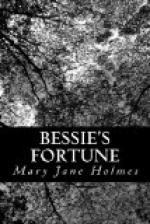“Your aunt, Miss BETSEY McPHERSON. Allington, Mass.
“P.S. I shall direct
this to the old home in Wales, though I have no
idea you are there, as I hear
your wife prefers to be traveling.”
The letter finished and directed, Miss Betsey sat a long time gazing dreamily into the fire and thinking of the past, the present, and the possible future, when a bright-haired child might be sitting there by her side and making her life less lonely and aimless than it was now.
Meanwhile the party at Grey’s Park had gathered around the fire in the drawing-room, and Geraldine was repeating to her sister the particulars of her presentation to the queen, shivering occasionally as she heard the sleet and snow beating against the window, for with the going down of the sun the storm had commenced again with redoubled fury, and the wind howled dismally as it swept past the corners of the house, bearing with it blinding sheets of snow and rain, and sounding some times like human sobbing as it died away in the distance.
“Is there some one crying outside, or is it the wind?” Mr. Jerrold asked, as the sobbing seemed like a wail of anguish, while there crept over him one of those indefinable presentiments which we have all felt at times and could not explain; a presentiment in his case of coming evil, whose shadow was already upon him.
“It is the wind,” Grey said. “What an awful storm for Thanksgiving night!” and rising, he walked to the window just as outside there was the sound of a fast-coming vehicle, which stopped at the side piazza.
A few moments later the door of the drawing-room opened, and a servant appeared with a note, which she handed to Mr. Jerrold, saying:
“Sam Powley brought this from your sister. He says your father is very bad.”
Mr. Jerrold was not greatly surprised. It seemed to him he had expected this, for the sobbing of the wind had sounded to him like his father’s voice calling to him in the storm. Taking the note from the girl, he tore it open and read:
“DEAR BROTHER: On my return home I found our father much worse, indeed, I have never seen him so bad, and he insists upon your coming to him to-night, so I have sent Sam for you, with instructions to call on his return for our clergyman, Mr. Sanford, as he wishes particularly to see him. Come at once, and come alone.”
“HANNAH.”
The words “come alone” were underscored, and Burton felt intuitively that the secret he had long suspected and which had shadowed his father’s life, was at last coming to him unsought. He was sure of it, and knew why Hannah had written “come alone.” It meant that Grey must not come with him, and when the boy who had stood beside him and read the note with him, exclaimed, “Grandpa is worse; he is going to die; let us go at once,” he said, very decidedly:




